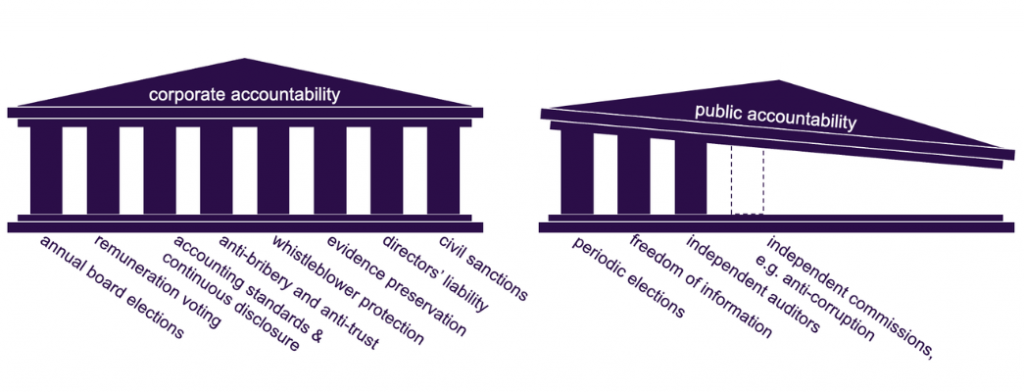Trust in corporate and public institutions is supported by formal governance structures and standards. In the early 2000s a crisis emerged in business governance, triggered by local and global scandals. Corporate governance and accountability requirements were reformed to better suit modern business practices and risks. By contrast, public governance and accountability structures have changed little, risking a similar collapse of public trust.
Public and private sector governance are both subject to the principal/agent problem, relying on people to put the interests of others ahead of their own.
In the 20th century, long-standing public and private corporate governance standards were trusted to regulate in the interests of company shareholders and the public. These standards relied heavily on moral obligations, conventions, and the ability of dissatisfied voters or shareholders to choose alternatives, either by voting for political change or selling their shares.
In the 21st century, a series of scandals prompted corporate reforms to increase board accountability. In the USA, Enron and WorldCom led to the Sarbanes-Oxley Act. Other nations followed similar paths, like Australia following the HIH Royal Commission.
Public sector governance faces new challenges that complicate accountability, like greater commissioning, public-private partnerships, and outsourcing. The growth of digital services and assets, and proliferation of unaccountable Ministerial advisors, add further complexity even as attempts to subvert the public interest, like fake news, become more sophisticated.
Political scandals and misconduct are often blamed for eroding public trust in liberal democracies, but public sector accountability frameworks have not responded by introducing new controls. Periodic elections and transparency regulations are not fit for the current context. The ’court of public opinion’ shields popular transgressors, or treats each case in isolation rather than systemically, and many citizens respond to scandals with apathy rather than outrage.

Understanding the strengths and failings of the system in its current context is an essential foundation for better governance. Private sector governance reforms followed comprehensive analysis, and demonstrations, of its flaws. The crisis in public governance and accountability requires similarly comprehensive examination, including of incidents that reveal systemic weaknesses that need structural solutions.
Tools for strengthening private sector governance included codified standards and procedures, sanctions for wrongdoers, independent oversight, and whistleblower protections. Similar standards, powers of investigation, sanctions, and protections should apply to all public officials. Just as private governance standards reach into the Boardroom, so public standards should reach into the Cabinet Room.
Modern governance challenges need modern accountability frameworks to rebuild and maintain confidence in public institutions. Broad-based reforms to corporate governance in response to cascading crises have gone a long way to restoring public trust in Boardroom accountability. Public sector governance and accountability needs similar reforms to meet public expectations and prepare for future challenges.
Core governance principles are relevant to the public sector as much as to the private sector, like active oversight by independent institutions, rules that reflect modern standards and operating contexts, and mechanisms for enforcement that deliver material consequences when behaviour falls short. We need to reinforce the governance structures that support public accountability, or risk public trust in our institutions being left in ruins.
